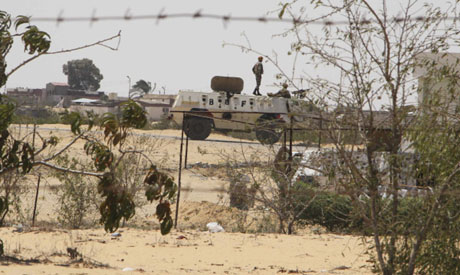
In this August 6, 2012 file photo, Egyptian border guards patrol in Rafah, Egypt. (Photo:AP)
Egyptian interior minister Ahmad Gamal Eddin met with top tribal chieftains in Sina on Friday. According to Ibrahim El-Menei, a tribal leader, the meeting resulted in an agreement to close the tunnels between Gaza and Egypt and to organise the bearing of weapons by Sinai inhabitants.
For the first time ever, the Egyptian authorities have agreed to involve the Sinai Bedouins in patrolling the borders.
Bedouin chiefs asked the interior minister for pictures to identify the people who were killed in the early stages of the current military operation in Sinai against militants suspected of involvement in last week's attack at the Egypt-Gaza border.
The destruction of the Rafah tunnels between Egypt and Gaza is now proceeding at a fast pace, with the army using heavy equipment and water to demolish the structures, with dozens now closed.
A Sinai local said that those arrested in the first combing operation are nine individuals, mostly from the Tarabin tribe in Sheikh Zuweid. Three of those have been released, all aged over sixty. Most of those detained had been investigated in connection with the Dahab bombings of 2006.
The local, who spoke on condition of anonymity, said that the raids on the Bedouin homes have been harsh, even by the standards of pre-revolutionary times. The harshness, he pointed out, may undermine the goal of eliminating terror.
Eleven Palestinians who came to Egypt through the tunnels are now being questioned about the routes of the tunnels, some of which end up in homes at both sides of the borders. The army is combing areas believed to be strongholds of the fundamentalist militants blamed for the recent attacks. The army is also getting ready to attack the Jabal Al-Halal area, believed to be a hotbed of jihad groups.
The army is currently collecting intelligence about Jabal Al-Halal, which is controlled by Bedouin outlaws.
According to Ibrahim Hammad, the Bedouin chief of Bir Al-Abd, Jabal Al-Halal is a particularly hard area for outsiders to penetrate, thus offering a natural haven for criminals and smugglers. Asked about the army's chances of success, Hammad said that taking control of the mountain is not going to be easy.
"This mountain is like a ghost area. It hasn't been attacked by outsiders even in the worst security conditions. Many of us know that Israel has strong links with this mountain and with the smuggling that's going on there," Hammad said.
Intent on finishing the job it started, the army is using heavy artillery, rockets, and airplanes in a wide-ranging offensive dubbed Operation Nesr, or Operation Eagle.
Military expert Adel Soliman warned that confrontations between a regular army and militiamen can produce unpredictable results.
"The groups that exist currently in Sinai are mostly Egyptians who fought in Afghanistan, where the terrain is similar to that of Sinai. They have connections with elements in the Palestinian side of Rafah and with Libyan and Sudanese militiamen," Soliman said.
Soliman believes that the groups active in northern Sinai belong to Al-Qaeda.
"These elements belong to groups that adopt the jihadist ideas and they have formed small jihad units that do not number more than a few dozens. Their theatre of operations is fashioned with the map of deployment in Sinai, especially Zone C, in mind. They carry out operations that are relatively simple but designed for maximum media effect."
According to the Egypt-Israeli peace treaty of 1979, Zone C is the section of Sinai close to the Israeli/Gaza border, inside which Egypt is only allowed to deploy civilian police.
Israel has allowed Egypt to send seven more brigades to the border zone, twice as much as the existing agreements permit.
The US, too, is said to be helping the Egyptian army and police through the provision of satellite imagery as well as the interception of terrorist-related communications.
A security source speaking on condition of anonymity said that Israel has never turned down Egyptian requests to send troops to Sinai.
"There is a common understanding between us and the Israeli side that no one can prevent Egypt from protecting its land regardless of the security addendum of the Camp David Accords. But we have to admit that we have been slow to act on more than one level and that we don't need just military action, but a new political approach, one that we haven't yet formulated," the source added.
Short link: